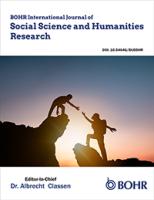Anachronism as a Means of Critical Pedagogy: Late Medieval German Verse Narratives as Tools of Social, Ethical, and Spiritual Investigations in Matters of Love
BOHR International Journal of Social Science and Humanities Research, 1 (1):
50--59 (2022)DOI: 10.54646/bijsshr.009
Zusammenfassung
Throughout time, love, sexuality, and marriage have mattered centrally in all of literature, and hence all of human existence. Although there seems to be an endless number of relevant guidebooks, counselors, and advisors who promise to help us navigate through the world of love, the real learning process in that regard begins within ourselves in direct confrontation with society or other individuals. Love is always dialogic. Late medieval (German) literature proves to be one of the most useful strategies in dealing with those powerful issues, perhaps surprisingly and certainly refreshingly. As this article illustrates through a close analysis of a sample of texts by three meaningful but also unusual poets, the study of those poems makes available a significant body of messages about human nature, and thus about virtues and vices. Love can hardly be imagined without some pain, struggle, and a sense of utopia, and these German poets, in close parallel with their European contemporaries, can thus be recognized as great inspirators for continuing the discourse on love even today.
